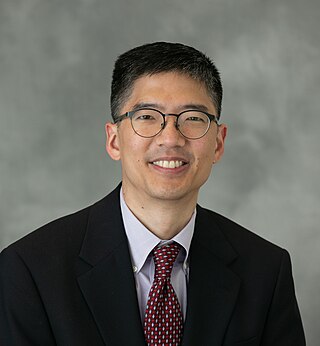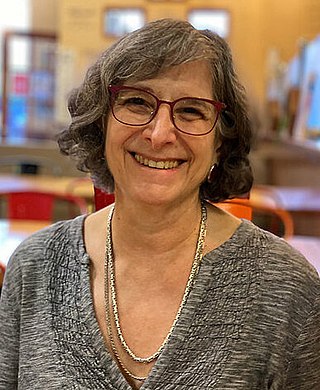
The National Institutes of Health, commonly referred to as NIH, is the primary agency of the United States government responsible for biomedical and public health research. It was founded in the late 1880s and is now part of the United States Department of Health and Human Services. Many NIH facilities are located in Bethesda, Maryland, and other nearby suburbs of the Washington metropolitan area, with other primary facilities in the Research Triangle Park in North Carolina and smaller satellite facilities located around the United States. The NIH conducts its own scientific research through the NIH Intramural Research Program (IRP) and provides major biomedical research funding to non-NIH research facilities through its Extramural Research Program.
The National Heart, Lung, and Blood Institute (NHLBI) is the third largest Institute of the National Institutes of Health, located in Bethesda, Maryland, United States. It is tasked with allocating about $3.6 billion in FY 2020 in tax revenue to advancing the understanding of the following issues: development and progression of disease, diagnosis of disease, treatment of disease, disease prevention, reduction of health care disparities within the American population, and advancing the effectiveness of the US medical system. NHLBI's Director is Gary H. Gibbons (2012–present).

Bernadine Patricia Healy was an American cardiologist and the first female director of the National Institutes of Health (NIH).
Joe G. N. "Skip" Garcia is an American pulmonary scientist, physician and academician.

Susan Shurin is a senior adviser at the National Cancer Institute. From 2006–2014, she served as Deputy and Acting Director of the National Heart, Lung, and Blood Institute (NHLBI) [NHLBI.nih.gov] at the National Institutes of Health [nih.gov] (NIH).

The NIH Intramural Research Program (IRP) is the internal research program of the National Institutes of Health (NIH), known for its synergistic approach to biomedical science. With 1,200 Principal Investigators and over 4,000 Postdoctoral Fellows conducting basic, translational, and clinical research, the NIH Intramural Research Program is the largest biomedical research institution on earth. The unique funding environment of the IRP facilitates opportunities to conduct both long-term and high-impact science that would otherwise be difficult to undertake. With rigorous external reviews ensuring that only the most outstanding research secures funding, the IRP is responsible for many scientific accomplishments, including the discovery of fluoride to prevent tooth decay, the use of lithium to manage bipolar disorder, and the creation of vaccines against hepatitis, Hemophilus influenzae (Hib), and human papillomavirus (HPV). In addition, the IRP has also produced or trained 21 Nobel Prize-winning scientists.
The Rare Diseases Clinical Research Network (RDCRN) is an initiative of the US Office of Rare Diseases Research (ORDR). RDCRN is funded by the ORDR, the National Center for Advancing Translational Sciences and collaborating institute centers. The RDCRN is designed to advance medical research on rare diseases by providing support for clinical studies and facilitating collaboration, study enrollment and data sharing. Through the RDCRN consortia, physician scientists and their multidisciplinary teams work together with patient advocacy groups to study more than 200 rare diseases at sites across the nation.
The Atherosclerosis Risk in Communities (ARIC) Study is a multi-site, prospective, biracial cohort study funded by the National Heart, Lung, and Blood Institute of the National Institutes of Health. The ARIC Study was designed to investigate the etiology and clinical outcomes of atherosclerosis. A total of 15,792 middle-aged men and women were enrolled from four U.S. communities:

Emily Ying Chew is an American ophthalmologist and an expert on the human retina with a strong clinical and research interest in diabetic eye disease and age-related eye diseases. She currently works for the National Eye Institute (NEI) at the National Institutes of Health (NIH) in Bethesda, Maryland, where she serves as deputy director of the Division of Epidemiology and Clinical Applications (DECA) and the Institute's deputy clinical director. She designs and implements Phase 1, 2 and 3 clinical trials at the NIH Clinical Center. Chew is board certified in ophthalmology.
Daniel Levy is a cardiologist who is the director of the Framingham Heart Study at the National Heart, Lung, and Blood Institute, a division of the National Institutes of Health (NIH). He is also Professor of Medicine at Boston University School of Medicine. He is known for his research on the epidemiology and genetics of heart failure and hypertension.

James M. Anderson is an American Professor of Medicine and Cell Biology and is a Chief of Section of Digestive Diseases at the Yale School of Medicine. Anderson is also a director of the Division of Program Coordination, Planning, and Strategic Initiatives at the National Institutes of Health.

Stephanie L. Constant is an American immunologist and science administrator. She was an associate professor at George Washington University and a scientific review officer at National Heart, Lung, and Blood Institute before becoming chief of the National Institute of General Medical Sciences Office of Scientific Review in 2017.
Gypsyamber D'Souza is an American epidemiologist. She is a professor of epidemiology at the Johns Hopkins Bloomberg School of Public Health. D'Souza researches infectious diseases, cancer prevention, and translational epidemiology. She is a principal investigator of the Multicenter AIDS Cohort Study / Women's Interagency HIV Study Combined Cohort Study (Mwccs.org).

Jodi Beth Black is an American microbiologist and research administrator serving as deputy director of the Office of Extramural Research at the National Institutes of Health. She was previously the director and vice president of research administration at the Translational Genomics Research Institute and the acting director of the division of extramural activities at the National Heart, Lung, and Blood Institute.

Courtney D. Fitzhugh is an American hematologist-oncologist and scientist. She is a clinical researcher and head of the laboratory of early sickle cell mortality prevention at the National Heart, Lung, and Blood Institute.

Dina Nicole Paltoo is an American epidemiologist specializing in open science, data science, and public access. She is the assistant director for scientific strategy and innovation at the National Heart, Lung, and Blood Institute.

Michael F. Chiang is an American pediatric ophthalmologist serving as the director of the National Eye Institute. His research focuses on the interface of biomedical informatics and clinical ophthalmology in areas such as retinopathy of prematurity (ROP), telehealth, artificial intelligence, electronic health records, data science, and genotype-phenotype correlation.

Julie Ann Panepinto is an American pediatric hematologist-oncologist and physician-scientist. She specializes in health outcomes research and sickle cell disease. Panepinto became the acting director of the division of blood diseases and resources at the National Heart, Lung, and Blood Institute in 2022. She was a professor of pediatrics and hematology at the Medical College of Wisconsin.

Véronique L. Roger is a French cardiologist and epidemiologist. She is a senior investigator and chief of the laboratory of heart disease phenomics at the National Heart, Lung, and Blood Institute.

Abby Gwen Ershow is an American nutritionist specialized in iodine nutrition, lipid metabolism, atherogenesis, and cardiovascular nutrition. She was a health science administrator at the National Heart, Lung, and Blood Institute from 1982 to 1989 and a senior nutrition scientist at the National Institutes of Health Office of Dietary Supplements from 2014 to 2021.














